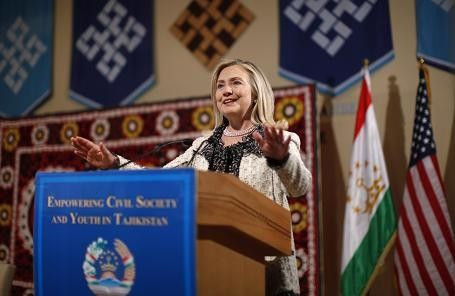Clinton Warns Iran: Don’t ‘Miscalculate’ As U.S. Troops Leave Iraq

United States Secretary of State Hillary Clinton has warned Iran that the scheduled withdrawal of U.S. combat troops from Iraq by the end of the year should not be mistaken for a lack of commitment to democracy in the region.
In an interview on Sunday on NBC's Meet the Press, Clinton, in Tashkent, Uzbekistan, on the last stop of her four-nation tour of the region, said that the United States knows that Iraq's progress to democracy will not be a straight line, and that it will experience setbacks and challenges.
We know that there will be continuing stresses and threats, as we see in many of the countries that we work, Clinton said. We know that the violence is not going to automatically end.
U.S. Still Has Substantial Presence in Region
However, Secretary Clinton underscored that the United States would maintain a substantial presence in the region.
We are providing a support and training mission. We will be there on the ground, working with the Iraqis, Clinton said. No one should miscalculate America's resolve and commitment to helping support the Iraqi democracy. We have paid too high a price to give the Iraqis this chance.
Clinton's message to Iran was blunt in its warning to Iran:
Iran would be badly miscalculating if they did not look at the entire region and [the entirety of] our presence in many countries in the region, both in bases [and] in training, [and] with NATO allies, like Turkey, Clinton said on CNN's State of the Union.
Clinton also reiterated that the December 2011 U.S. withdrawal from Iraq was already agreed to with the Iraqi Government by former President George W. Bush, prior to President Barack Obama's inauguration.
Clinton added that critics of the U.S. withdrawal from Iraq can't have it both ways.
Now, you can't on the one hand say you are all for democracy and sovereignty and independence where people make their own choices, and on the other hand say when a choice is made that is foreseen by our government going back to the Bush administration . . . that that is somehow not appropriate, Clinton said on Fox News Sunday.
Political/Public Policy Analysis: The United States will remove combat troops from Iraq at the end of 2011 after the death of 4,468 U.S. Armed Forces personnel in the Iraq War. The war has cost $800.3 billion to-date, and counting. Dictator Saddam Hussein was removed from power, ending decades of horrific oppression, and Iraq now has a chance to build its own future, with sovereignty, independence and democratic norms.
However, given the uncertainty regarding Iraq's form of government and its stance toward its neighbors, and other factors relating to the U.S. intervention, it's far too soon to form a meaningful conclusion regarding President George W. Bush's decision to go to war in March 2003. Too many unknowns exist, not the least of which concerns -- given the U.S.'s high per capita consumption of oil -- the life-span of Saudi Arabia's oil fields. At a minimum of 115 billion barrels, Iraq probably has the fourth largest proven oil reserves in the world, after Saudi Arabia, Iran and Canada -- oil reserves that likely would serve as one alternate source of oil, should Saudi production start to decline in 10 or 20 years.
© Copyright IBTimes 2024. All rights reserved.




















